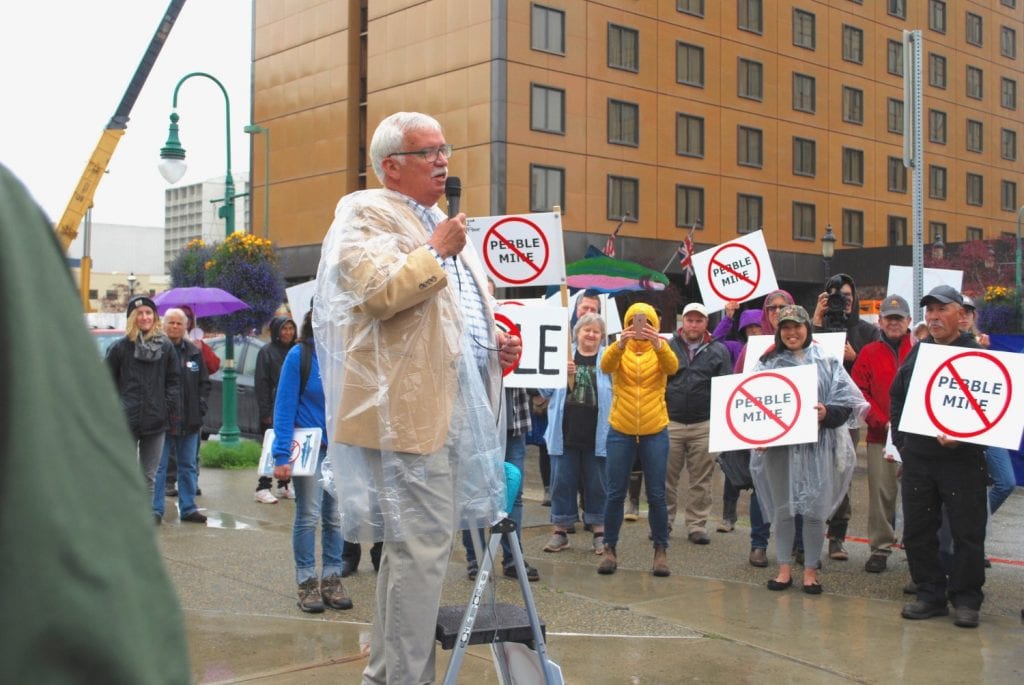
A final federal decision issued by the U.S. Army Corps of Engineers denies a critical clean water permit for the proposed Pebble mine, leaving out on a limb a project fought over in public hearings and court battles for well over a decade.
In a special email note to several dozen tribal officials in Bristol Bay on Wednesday, Nov. 25, the Corps said that the Alaska District of USACE had determined that the project cannot be permitted as proposed. The Corps found that the proposed project, abutting the Bristol Bay watershed, would not be in the public interest, because it does not comply with guidelines of the Clean Water Act.
The Pebble project for a proposed open-pit, large-scale mine in the Bristol Bay region, would impact several thousand acres of wetlands and waters and roughly 120 miles of streams in the Koktuli River watershed.
The Corps decision sent shockwaves through both sides on the controversial mine plan, the subject of numerous public hearings and courtroom battles.
As word of the Corps’ decision spread, mine opponents heralded the Corps decision, and the Pebble Limited Partnership said they would appeal the Corps’ decision.
“We are obviously dismayed by today’s news given that the USACE had published an environmental impact statement in July that clearly stated the project could successfully coexist with the fishery and would have provided substantial economic benefit to the communities closest to the deposit,” said John Shively, chief executive officer of the PLP, in a statement.
Shively said the project would have co-existed with the world’s largest sockeye salmon fishery, a multi-million dollar commercial and sport fishery, which is also critical to subsistence users and wildlife in the Bristol Bay region. This is a loss of economic opportunities for people living I the area, said Shively, “a politically driven decision [that] has taken away the hope that many had for a better life.”
Mine opponents, meanwhile, were exuberant.
“This us a joyous and momentous day for Bristol Bay fishermen,” said Andy Wink, executive director of the Bristol Bay Regional Seafood Development Association, which represents some 1,400 Bristol Bay driftnet permit holders. “So many people have dedicated so much of themselves to effectively participate in this process for the sake of our businesses, our families, the local residents, future generations, and most of all for the millions of salmon that call Bristol Bay home.”
“Make no mistake,” said BBRSDA vice president Michael Jackson. “The good guys won here and this is a time to celebrate and be thankful, yet we all know that tomorrow our work begins on another front and that we all must stay vigilant, stay informed, and support all efforts to bring permanent protections for the Bristol Bay watershed.”
Jason Metrokin, president and CEO of the Bristol Bay Native Corp., called the Corps’ decision “a triumph for the people of Bristol Bay who have fought tirelessly against Pebble mine for well over a decade.” Metrokin said the regional Alaska Native corporation was still reviewing details of the decision but meanwhile it remains clear “that Pebble is not in the best interests of Bristol Bay and those whose livelihoods depend on its incredible fishery.”
Chris Wood, president and CEO of Trout Unlimited, described the decision as “a victory for common sense,” saying Bristol Bay was the wrong place for industrial scale mining.
While mine advocates are preparing their challenge in the court system, opponents of the mine said they would work with Bristol Bay residents, Alaska’s congressional delegation, the state and other partners to permanently protect Bristol Bay and its world class fisheries.
“Sometimes a project is so bad, so indefensible, that the politics fall to the wayside and we get the right decision” said Tim Bristol, executive director of SalmonState. “But denial of a permit does not mean Bristol Bay is safe from the threat of the Pebble mine. The critical next step is to reestablish the Clean Water Act protections for America’s greatest salmon fishery, protections that should have never been done away with in the first place.
“This can and should be an early priority for the Biden administration,” he said.
Robert Heyano, president of United Tribes of Bristol Bay, agreed. “We will continue to advocate for permanent protections for Bristol Bay until we are sure that our pristine lands and waters will remain intact for our children’s children and all future generations,” he said.
Senators Lisa Murkowski and Dan Sullivan, both R-Alaska, also applauded the Corps’ decision.
“This is the right decision, reached the right way,” Murkowski said. “It should validate our trust and faith in the well-established permitting process used to advance resource development projects throughout Alaska. It will help ensure the continued protection of an irreplaceable resource – Bristol Bay’s world-class salmon fishery – and I hope it also marks the start of a more collaborative effort within the state to develop a sustainable vision for the region.”
Sullivan said he will continue to be a strong advocate for resource development jobs, but still “given the special nature of the Bristol Bay watershed and the fisheries and subsistence resources downstream, Pebble had to meet a high bar so that we do not trade one resource for another,” he said.





